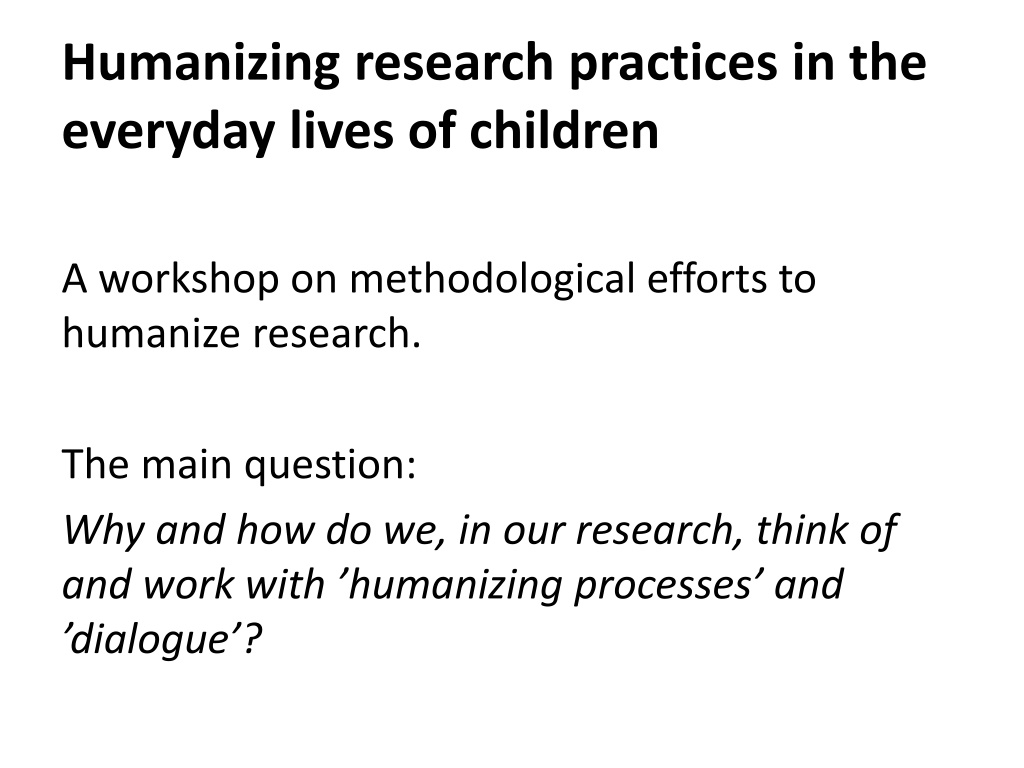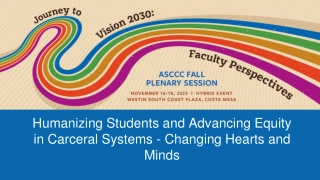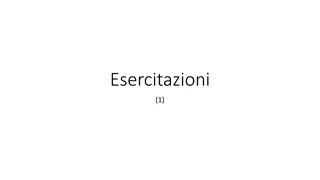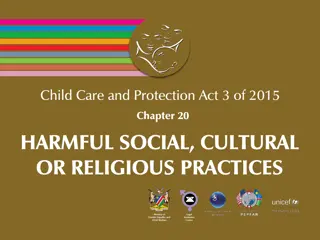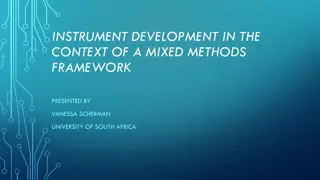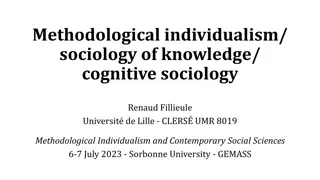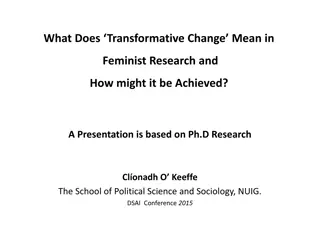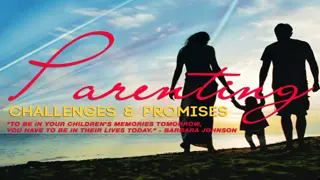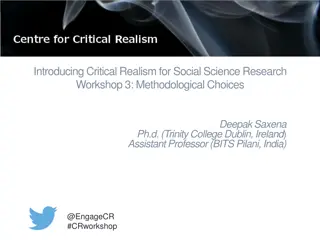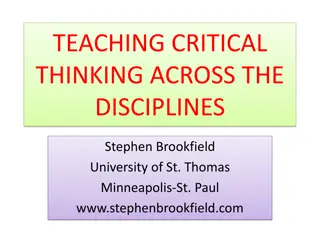Humanizing Research Practices with Children: Methodological Efforts and Critical Perspectives
Workshop focusing on humanizing research methods with children, emphasizing critical psychology theories and engaging children as active participants in research. The approach challenges traditional psychological norms, promoting dialogue and understanding children as subjects in their own lives.
Download Presentation

Please find below an Image/Link to download the presentation.
The content on the website is provided AS IS for your information and personal use only. It may not be sold, licensed, or shared on other websites without obtaining consent from the author. Download presentation by click this link. If you encounter any issues during the download, it is possible that the publisher has removed the file from their server.
E N D
Presentation Transcript
Humanizing research practices in the everyday lives of children A workshop on methodological efforts to humanize research. The main question: Why and how do we, in our research, think of and work with humanizing processes and dialogue ?
3 Ph.D.-projects Tilde Mardahl-Hansen Teacher professionalism and inclusion in school . Kurt Bendix-Olsen Small children s perspectives on inclusive practice Crisstina Munck Young children s communities in an ambiguous day care practice
1 common interest To do qualitative research with and about children that are based on the theoretical background of critical psychology (Holzkamp; Dreier; H jholt; Schraube & Osterkamp) 1) Critical approach to mainstream psychology; From abstract and universel being to concrete being 2) Psychology from the standpoint of the subject; Children are understood as subjects in their own life and therefore we do not only do research on children but with children
A critical standpoint Critical stance towards the psychological tradition of diagnosing and categorizing children in order to understand problems in the world. Children with difficulties or children in difficulties? .
Concept of knowledge Knowledge about psychological aspects as they unfold in social practice; to study the relationship between personal reasons and social conditions (H jholt s. 4) 1) Knowledge is distributed 2) Valid knowledge is unevenly distributed 3) As researchers we are also part of what we investigate
Our research position Participating in the social practice. Taking part and changing social practices. ( Bias no other way knowlegde is embedded) Intersubjectivity, sensing situations, situated ethics is called for. Co-research. Transparent research position.
Why engage in dialogue with children? Rejecting a privileged and neutral (top down) focus on the detached , abstracted, universal individual, isolated psychological functions and isolated places Dialogue understood as situated social interplay in a wide sense Children as subjects in their own lives children s personal perspectives in focus engagements, intentions, directionality, participation
Development as dialectical Children s development is related to the concrete life they lead, their engagements and their conditions for taking part are important processes to study from a variety of places and positions A social self-understanding grows out of our conduct of life. The subject has personal reasons for living his/her life in this particular way. Self- understanding and the conduct of life to be seen as a dialectic relationship
Participation an analytical concept to investigate social practice with -a definition (H jholt 2001) The concept of participation requires a subject (one who is participating), others (the subject is part of something where other subjects are participating), a cause (something to take part in the subject is participating in relation to something). Participation is an individual action connected to others and directed at someting. (H jholt, 2001: 58 (our translation))
Participant observation in social practice Studying social contexts and subjects as intertwining, consitutive and inseparable Studying doing and participation situated and as social practices connected to historical arrangements i.e. institutions, day care Following different perspectives, i.e. several individual trajectories as they unfold in time and place as a way to gain insight into how subjects develop agency and take part in the social practice of becoming persons
Doing participant observation, a closer look When observing and taking part in a given situation we can ask ourselves and look from the children on to: How is it to be part of this arrangement? As participation is both personal and social What can I do here? What are my possibilities here? As participation is ongoing, processual and shifting (often conflictual) How can I connect, keep up, coordinate, develop and have a say on my interests interlinked with others across time and contexts? As participation is potentially mediating social constraints and social structures How are problems emerging and manifesting themselves in social practice? And how do they change, dissapear or dissolve in certain kinds of social cooperation?
The ambigous child communities in day care how small children take part in social interplay?
A Ph.d. Research project To explore the children s meaning-making and what seems to matter to the children in their institutional lives. 44 Participant observations in two public day cares. Following to small groups of children, approximately 12 children aged between 6 month and 2.10 years and 3 professionals.
To explore childrens perspectives Children s perspectives must be explored in relation to their conditions for taking part different places. (H jholt, 205, 2012) Following the children around can be unfolded as ( ) walking alongside the children, paying attention to what happens on the way, being led by the children s activities and engagements what seems to matter to them. (Kousholt, 250, 2015)
Lunch as a contradictory social practice Practice are many-sided and are intertwined by contradictory understandings of the children and their development. The children are directed at taking part in social interplay with each other and at the same time they are directed at taking part in what the pedagogues are arranging. The children take part in lunch by negotiating and challenging how they can engage in social interplay.
What matter to the children while eating lunch? (P = pedagogue) The children are eating soup at lunch. I am sitting with Betty (P) and Anne (P). Sally and Noah are sitting next to each other. They are looking at each other, smiling. Peek a Booh , says Sally and hides her face in her hands. Then she looks up at me and says very quietly Peek a Booh and smiles. I respond with a Booh and smiles back to Sally. Noah looks at Sally and hides his face in his hands. Then he looks up and says loudly Booh . Noah has poured some water on the table and he try to scrape the water up with a spoon. One of the pedagogues says to Noah, you have to behave properly when we are eating lunch and you should not pour water on the table . Then Sally looks at Noah and says stop while she hold her hand up in front of Noah showing that she knows how to behave properly. Betty (P) says to Sally, I have control over the situation , while she puts her hand on Sally s arm. Once more, Noah is told, to stop pouring water on the table. Noah looks at Anne (P), smiles and continues to scrapes water from the table. Sally looks at Noah and tries to help scrape the water off the table, while she smiles at Noah. Noah smiles back at Sally.
The children are arranging the arrangements Sally and Noah are adapting to and changing how to eat lunch at the same time, through their interplay. There seems to be different agendas and still, the children and the pedagogues share a social practice have a common interest. The children s and the pedagogue s agendas are intertwined and mutually constitutive.
Nursery life as a myriad of activities The children are often engaged in different activities at the same time. Children s activities change and develop in new directions all the time. Children s activities must be seen as connected to the structures and pedagogical arrangements during the day.
Expectations to childrens behavior The pedagogues statement to Noah, you have to behave properly when we are eating lunch and you should not pour water on the table An instrumental statement -showing a perception of, we (the pedagogues) all agree on how children should behave during lunch . Connected to a normativity regarding children s upbringing.
An inclusive lunch? The pedagogues have a pedagogical responsibility to make sure that all the children take part in the child community around the table. There must be room for everyone and not just someone. The pedagogue s statement I am in control over situation can, from this point of view, be interpreted as a way of ensuring an inclusive lunch, where everybody can join and take part equally.
Sidste slide er til flles dialog (den kan jeg evt introducere?)
References Dreier, O. (2008): Psychotheraphy in Everyday Life. Cambridge University Press. H jholt, C. (2001): Udvikling gennem deltagelse. In: H jholt, C. & Witt, G./ed.: Skolelivets socialpsykologi. Nyere Socialpsykologiske perspektiver, Unge p dagoger, K benhavn. H jholt, C. (2005): Pr sentation af praksisforskning. In: H jholt, C./ed.: For ldresamarbejde. Forskning i f llesskab. Dansk Psykologisk Forlag. H jholt, C. & Kousholt, D. (2011): Forskningssamarbejde og gensidige l reprocesser. In: H jholt, C./ed.: B rn i vanskeligheder. Samarbejde p tv rs. Dansk Psykologisk Forlag. Lave, J. & Wenger, E. (2003): Situeret l ring og andre tekster. Hans Reitzels Forlag, K benhavn
